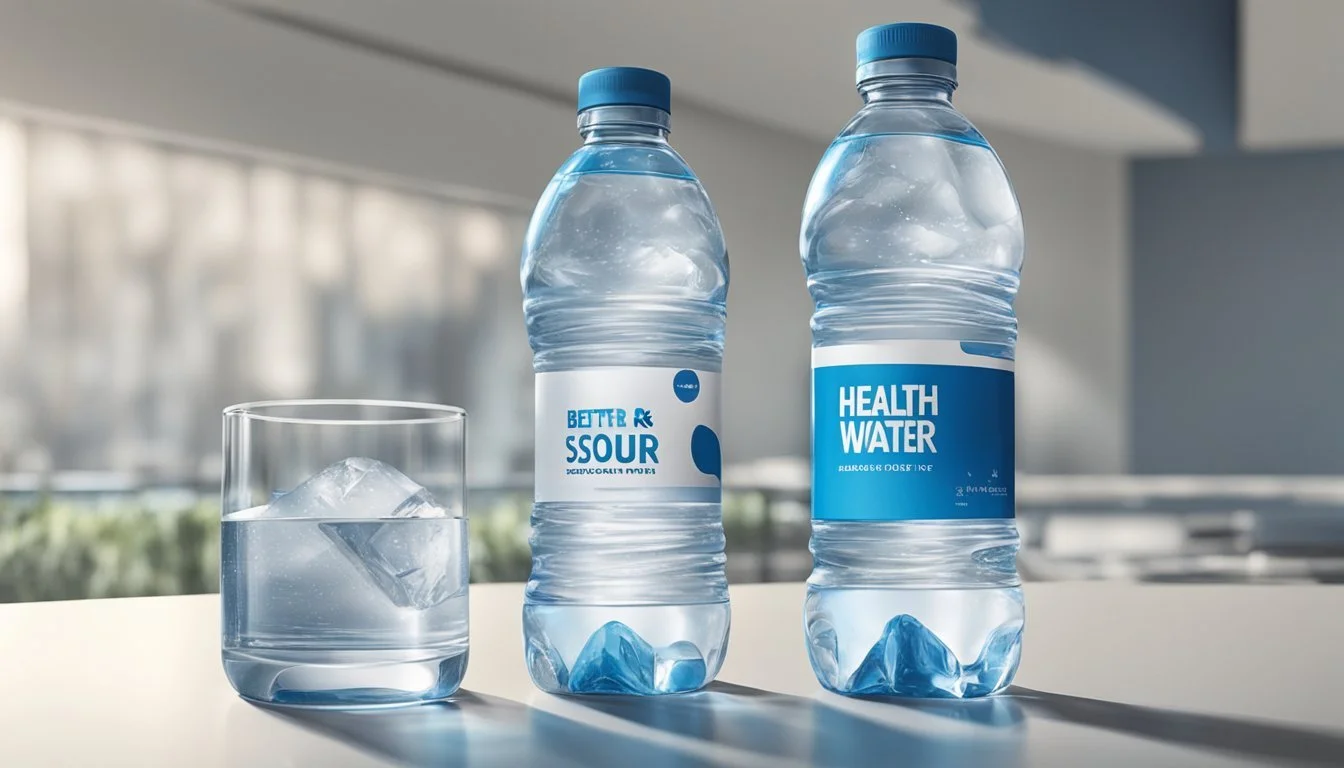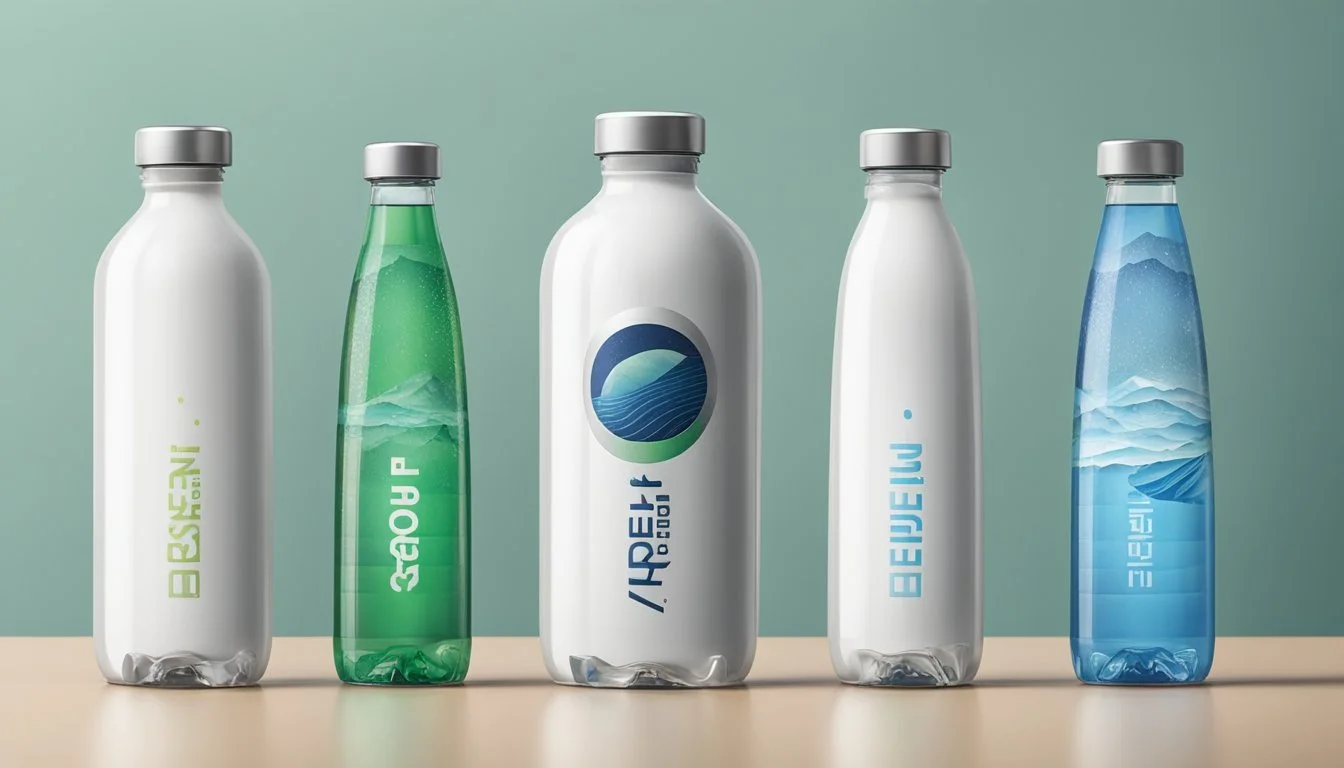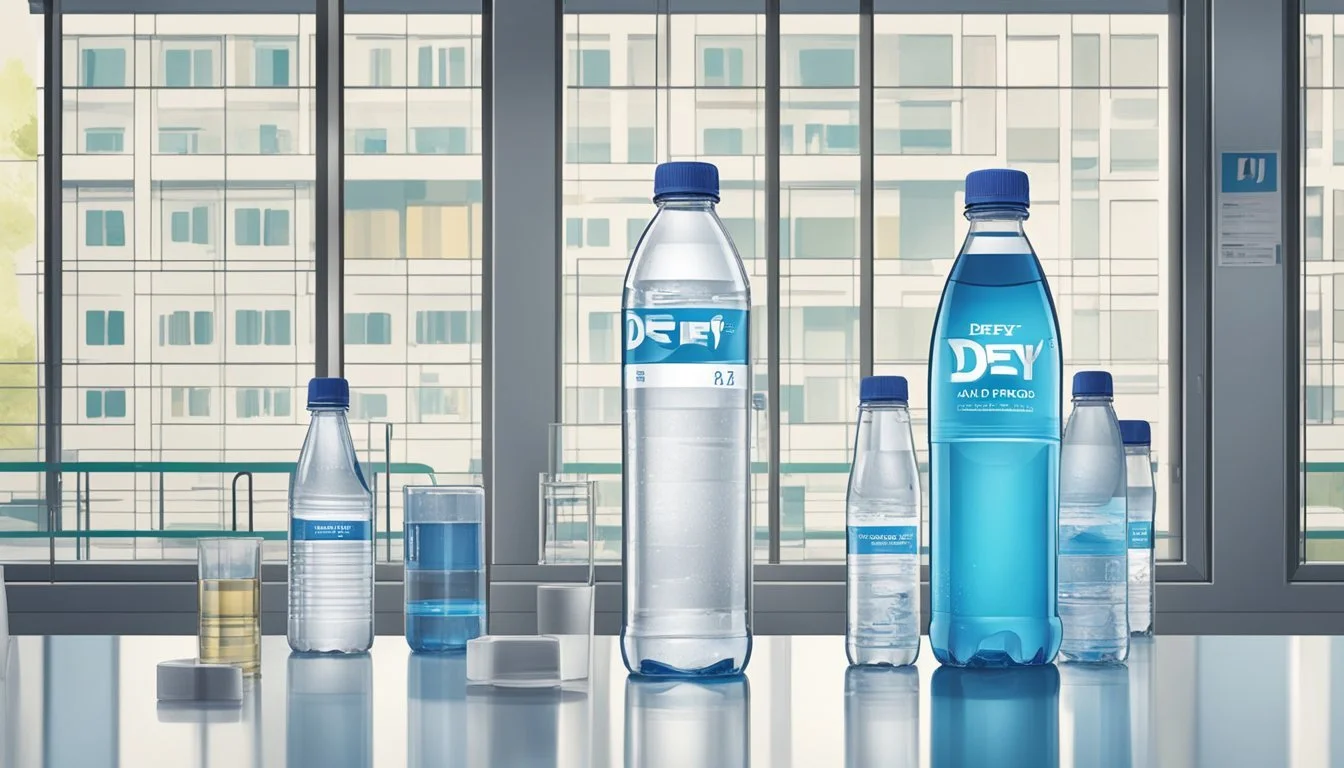Defy vs. Proud Source
Bottled Water Comparison Guide
When it comes to choosing bottled water, consumers often seek the best option for taste, purity, and overall quality. Defy, co-founded by former NFL running back Terrell Davis, provides a solid middle-of-the-road experience, making it a popular choice among mainstream bottled waters. Proud Source, on the other hand, offers a pH of 8.1 and a TDS reading of 132 ppm, showcasing its mountain spring origins.
If the goal is a clean, natural-tasting water, Proud Source edges out Defy with its higher pH and balanced mineral profile. Some might find Defy’s taste less distinct, but still satisfactory for daily hydration needs. Both brands promise essential hydration, but the choice depends on personal preferences regarding taste and source quality.
Readers will find an in-depth comparison in the upcoming sections, exploring the unique attributes of each brand. Discovering which bottled water is better suited for your lifestyle can enhance your hydration experience.
Understanding Bottled Water
Bottled water comes in various forms, each with distinct sources, treatments, and purposes. It's important to consider the types of bottled water, regulatory standards governing its quality, and its environmental impact.
Types of Bottled Water
Spring water is sourced directly from natural springs. It is often marketed for its purity and natural mineral content.
Purified water undergoes processing like distillation or reverse osmosis to remove impurities. It may originate from any water source but is purified to meet certain standards.
Mineral water contains a specific amount of minerals, naturally occurring from its source. The FDA mandates that mineral levels must remain constant.
Alkaline water has a higher pH level, often achieved through ionization. It is purported to offer various health benefits.
Electrolyte water contains added minerals and salts to enhance hydration, often marketed towards athletes.
Bottled Water Regulations
The FDA regulates bottled water as a packaged food product. Standards set by the FDA include limits on contaminants and requirements for good manufacturing practices.
The EPA oversees public water systems, ensuring tap water safety through the Safe Drinking Water Act.
Bottled water must meet stringent labeling requirements. Terms like "spring water" and "mineral water" must adhere to federal definitions.
Compliance is monitored through inspections and testing, making sure environmental and safety standards are upheld. This helps prevent contamination from harmful substances like BPA in plastic bottles.
Environmental Considerations
Single-use plastic bottles present significant environmental challenges. Recycling rates are low, and plastic waste contributes to pollution.
Some brands focus on being environmentally friendly by using sustainably sourced water and biodegradable or recyclable packaging.
Planet-friendly initiatives include reducing carbon footprints through energy-efficient production methods.
Consumers are encouraged to be aware of the environmental impact of their choices, opting for products that prioritize sustainability.
Awareness and efforts to reduce single-use plastics can play a crucial role in mitigating environmental damage caused by bottled water.
Health and Hydration
When comparing Defy and Proud Source bottled water, it's essential to consider the health implications and hydration benefits of each. Critical factors include their mineral content and the quality of water.
The Role of Minerals
Mineral content plays a significant role in the health benefits of bottled water. Proud Source is known for its high mineral content, including calcium, magnesium, and potassium, which are crucial for bodily functions.
Calcium supports bone health.
Magnesium aids in muscle function.
Potassium balances fluids and electrolyte levels.
Defy focuses on providing water with added electrolytes, aimed at enhancing hydration and replenishing lost minerals after physical activities. These electrolytes, including sodium and potassium, are vital for maintaining hydration and preventing cramps, especially during exercise.
Water Quality and Health Effects
Water quality profoundly impacts health, particularly when considering contaminants and purity levels. Proud Source sources its water from natural springs, ensuring it is free from contaminants, including heavy metals like lead and toxic chemicals such as PFAS.
In contrast, Defy emphasizes a purification process that removes impurities and adds electrolytes for enhanced hydration. Both brands guarantee safe drinking water, but their approaches differ. Proud Source relies on natural purity, while Defy uses advanced purification technologies.
Municipal tap water can vary in quality, with possible contaminants that both brands effectively eliminate. Additionally, fluoride levels are naturally managed in Proud Source, while Defy's controlled addition ensures safe consumption without exceeding recommended levels.
Comparing Defy and Proud Source
When evaluating Defy and Proud Source, key differences emerge in their taste profiles, source and processing, packaging, and economic considerations. Each factor plays a significant role in determining which bottled water meets specific preferences and needs.
Taste Profiles
Defy is known for its crisp and clean taste, achieved through a meticulous reverse osmosis process. This advanced filtration removes impurities, providing a neutral and refreshing flavor. Defy's reverse osmosis also regulates the pH levels, typically resulting in a balanced profile around neutral, which many consumers prefer for a pure water experience.
Proud Source, on the other hand, boasts a natural spring water origin with a pH level of 8.1. This higher pH imparts a slightly sweet taste, while the mineral content, including calcium, magnesium, and potassium, adds a subtle complexity. The TDS reading of 132 ppm indicates mineral-rich water, appealing to those who enjoy a more enhanced flavor profile.
Source and Processing
Defy obtains its water from municipal sources before subjecting it to reverse osmosis. This process involves forcing water through a semi-permeable membrane to remove contaminants and minerals, ensuring a high purity level. Distillation may also be used to further refine the water, making Defy a reliable choice for those seeking pure, clean hydration.
Proud Source sources its water from natural springs, emphasizing minimal processing to maintain the water's natural quality. The spring water is directly bottled at the source, preserving its mineral content and natural characteristics. This method supports the product’s earth-friendly ethos and aligns with consumer preferences for minimally processed, natural beverages.
Packaging and Convenience
Defy offers its product primarily in plastic water bottles, designed for convenience and widespread distribution. These bottles are lightweight, portable, and fit easily into various settings such as gyms, offices, and outdoor activities. The focus on convenience makes Defy a practical option for on-the-go hydration.
In contrast, Proud Source uses reusable, BPA-free aluminum bottles, aligning with a sustainable philosophy. These bottles are not only recyclable but also more durable than plastic, reducing environmental impact. However, the weight and potential inconvenience of aluminum bottles might be a consideration for some users.
Economic Considerations
Defy positions itself as an affordable option within the bottled water market, offering competitive pricing due to its use of reverse osmosis and municipal sources. This makes it accessible to a broad audience, appealing to budget-conscious consumers without compromising on quality.
Proud Source, with its emphasis on sustainability and natural spring water, operates at a higher price point. The cost reflects the premium nature of its product, including the sustainable packaging and the minimal processing of the natural spring water. This price may restrict its audience to those willing to invest in higher-quality, environmentally-friendly bottled water.
By examining these factors, individuals can better determine which brand aligns with their preferences and values.
Analyzing Water Quality
When comparing Defy and Proud Source bottled water, it's essential to examine their water quality comprehensively. This involves evaluating the pH and alkalinity, contaminant levels, and water purification processes used by each brand.
pH and Alkalinity
Defy and Proud Source differ significantly in pH levels. Proud Source has a pH of 8.1, making it alkaline water, which can help neutralize acidity in the body. Alkaline water is said to counteract acid reflux due to its higher pH. On the other hand, the pH level of Defy is not widely advertised, making it necessary to conduct a pH test to determine its alkalinity or acidity.
Alkalinity can impact taste and potential health benefits. For those concerned with acid reflux or seeking alkalinity, Proud Source's higher pH may be more appealing. Each brand’s pH level can also influence the water’s interaction with minerals and contaminants.
Contaminant Levels
Ensuring that bottled water is free from harmful substances is crucial. Proud Source boasts relatively low total dissolved solids (TDS) at 132 ppm, indicating fewer impurities and minerals that could include lead or heavy metals. Consumer Reports found toxic PFAS chemicals in several bottled water brands, but specific testing on Defy isn't mentioned in recent reports.
Contaminant levels like lead, other heavy metals, and PFAS chemicals are vital factors. Defy needs explicit testing to confirm its purity, especially since some bottled waters can contain residues from groundwater or municipal water sources.
Water Purification Processes
Proud Source sources its water from mountain springs, applying minimal treatment processes to retain natural minerals. They likely use filtration to remove larger particulates but don't heavily alter the water’s mineral content. This approach maintains its naturally alkaline properties without additional processes.
Defy's water treatment involves more intensive methods, potentially using reverse osmosis, distillation, or deionization to ensure purity. These processes remove impurities and contaminants but can also strip the water of beneficial minerals. Reverse osmosis, in particular, is effective at removing a wide range of contaminants but requires additional re-mineralization steps to maintain desirable pH levels.
Here is a summary comparison of their purification processes:
Brand Purification Process Benefits Proud Source Filtration Maintains natural minerals, alkalinity Defy Reverse Osmosis, Other Methods High purity, needs re-mineralization
Sustainability and Environmental Impact
When examining the sustainability and environmental impact of Defy and Proud Source bottled waters, two critical areas surface: the type of packaging used and the conservation of the water sources. Both brands claim environmentally friendly practices but differ significantly in their approaches.
Bottles and Packaging
Defy uses single-use plastic bottles which are often criticized for contributing to plastic pollution. These plastic bottles, usually made from PET, are recyclable but still pose significant environmental challenges. Recycling rates for PET remain low, meaning much ends up in landfills or oceans.
In contrast, Proud Source opts for boxed water packaging, which is seen as a more sustainable choice. Boxed water packaging is generally easier to recycle and has a lower carbon footprint during production. Additionally, Proud Source promotes reusable bottles, encouraging consumers to reduce their environmental impact further.
Both brands aim to reduce the BPA content in their packaging, acknowledging the health risks associated with this chemical. The emphasis on limiting single-use plastics positions Proud Source as a more proactive choice for environmentally conscious consumers.
Water Source Conservation
Defy and Proud Source both stress the importance of sustainably sourced water. Defy's water comes from natural springs and groundwater, promising that these sources are managed responsibly to ensure long-term viability.
Meanwhile, Proud Source highlights its commitment to environmentally friendly practices by protecting local ecosystems. They utilize natural spring water located in areas free from industrial contamination. Strict oversight helps to minimize the environmental impact and ensure that water extraction does not harm the surrounding ecosystem.
Both brands strive to protect water sources, but Proud Source’s focus on local conservation efforts and lower environmental impact sets it apart. This detailed attention to the sustainability of sourcing practices supports their claim of being better for the planet.
Consumer Considerations
Consumers often evaluate bottled water based on taste preference and cost and accessibility. Examining these aspects can help determine which brand fits individual needs better—Defy or Proud Source.
Taste Preference
Taste is a significant factor for many when selecting bottled water. Consumers often associate taste with quality and freshness. In taste tests, some find that Defy offers a clean, neutral flavor, preferring it for its crispness. Conversely, Proud Source’s spring water from Idaho may have a unique metallic or wet paper-like taste, which some consumers might find off-putting.
Packaging can also influence taste perception. Defy's plastic bottles are often perceived as standard, whereas Proud Source uses metal bottles, which may affect taste and have an environmentally friendly appeal. Ultimately, personal preference highly influences which taste is preferred.
Cost and Accessibility
Cost and accessibility can heavily influence consumer decisions. Defy water is typically found in major grocery stores and convenience stores, making it readily accessible. It usually has a competitive price point, appealing to budget-conscious shoppers. Depending on the store, prices may vary, but it generally remains inexpensive.
Proud Source, on the other hand, might be found in specialty stores and select grocery outlets. Its metal packaging is considered premium, which often reflects in a higher price point. Consumers concerned with sustainability might justify the expense, seeing the value in its eco-friendly approach. Brand loyalty can also play a role, with some consumers willing to pay more for a brand they trust.
More About Defy
Mountain Valley Spring Water vs Defy: Which Bottled Water is Better?
Whole Foods Italian Still Mineral water vs Defy: Which Bottled Water is Better?
More About Proud Source
Aqua Carpatica vs Proud Source: Which Bottled Water is Better?
Cascade Mountain vs Proud Source: Which Bottled Water is Better?
Core Hydration vs Proud Source: Which Bottled Water is Better?
Crystal Geyser vs Proud Source: Which Bottled Water is Better?
Crystal Lake vs Proud Source: Which Bottled Water is Better?
Hawaii Volcanic vs Proud Source: Which Bottled Water is Better?
Hawaiian Springs vs Proud Source: Which Bottled Water is Better?
Ice Mountain vs Proud Source: Which Bottled Water is Better?
Icelandic Glacial vs Proud Source: Which Bottled Water is Better?
Kirkland Signature vs Proud Source: Which Bottled Water is Better?
Liquid Death vs Proud Source: Which Bottled Water is Better?
Mountain Valley Spring Water vs Proud Source: Which Bottled Water is Better?
Nestle Pure Life vs Proud Source: Which Bottled Water is Better?
Poland Spring vs Proud Source: Which Bottled Water is Better?
Proud Source vs Essence pH10: Which Bottled Water is Better?
Purely Sedona vs Proud Source: Which Bottled Water is Better?
Richard's Rainwater vs Proud Source: Which Bottled Water is Better?
San Pellegrino vs Proud Source: Which Bottled Water is Better?
Simple Truth vs Proud Source: Which Bottled Water is Better?
Solan de Cabras vs Proud Source: Which Bottled Water is Better?
Talking Rain AQA vs Proud Source: Which Bottled Water is Better?
Whole Foods 365 vs Proud Source: Which Bottled Water is Better?
Whole Foods Italian Still Mineral water vs Proud Source: Which Bottled Water is Better?






